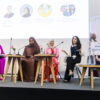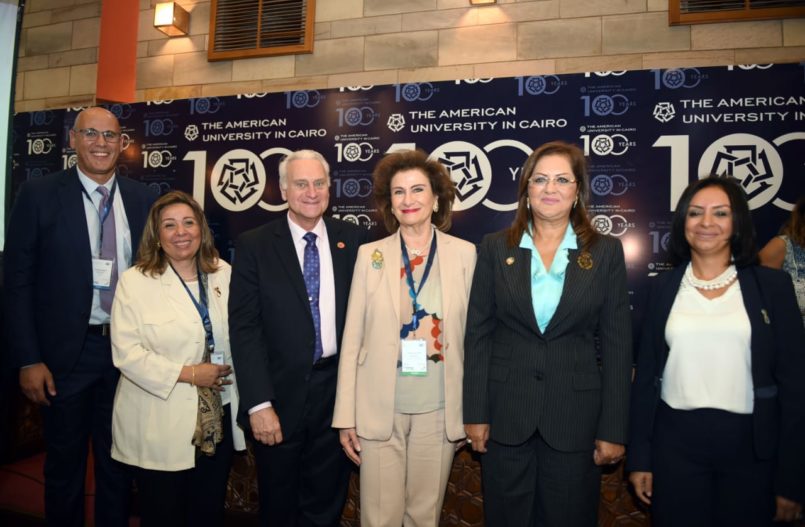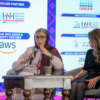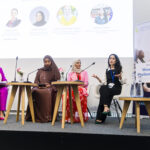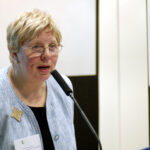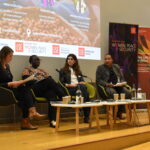On 11 November 2019, following the highly successful conference in Cairo in September 2019 on Women as Engines of Economic Growth, AIWF launched a Special Report which documents the key points of the high-level panel deliberations and outlines the substantive, impact-oriented and actionable recommendations to emerge from this milestone AIWF conference held at and in partnership with the American University in Cairo on 17 September 2019 as part of AUC’s Centenary Celebrations.
Women as Engines of Economic Growth was a major milestone in AIWF’s 19-year history of advocacy and action for women and young people in the MENA Region and internationally, strengthening AIWF’s growing international advocacy network of key partners and institutions equally committed to empowering and supporting women’s leadership in all sectors and spheres.
After consultation with all valued Guest Speakers and key stakeholders, AIWF announced the publication of the Women as Engines of Economic Growth Special Report and the 38 high-level Recommendations which are focused around skills building, reskilling and upskilling as part of education reform in STEM to prepare the workforce of the future; legislative reform to ensure gender-neutral legislation and implementation on the ground; promoting quotas and eliminating nepotism to increase female representation on corporate boards; reforming inheritance law and property rights to empower women’s entrepreneurship in agriculture; supporting women in entrepreneurship and introducing social enterprise laws across the region.
The Recommendations also call for workplace policy change with regard to updating labour codes around workplace regulations, maternity and parental leave, childcare and elderly care policies; addressing the lack of research and data in the region available openly and in the Arabic language as this is vital to strategic policy design; re-educating the media on representing women and leadership in many forms – in business, in communities and within families; crowdsourcing tech solutions to agricultural issues and aligning technical agriculture education with agribusiness and industry especially the food industries; improving access to financial literacy training; and investing in the care economy, the rural economy and in digital infrastructure.
The full Report and Recommendations are available in English for download from the AIWF website (www.aiwfonline.com), and upon publication were widely shared by AIWF with a diverse range of valued global partners and key contacts across the governmental, academic, private sector and international development spheres, including the World Bank, the League of Arab States, UN organisations and agencies, the International Monetary Fund, the European Bank for Reconstruction and Development (EBRD), the International Labour Organisation (ILO), the Union for the Mediterranean, the Food and Agriculture Organization of the United Nations (FAO), the United Nations Development Programme (UNDP), the Economic and Social Commission for Western Asia (ESCWA), USAID, UN Women, the MENA-OECD Investment Programme, the Arab Women Council, Education for Employment (EFE), the World Food Programme, the International Food Policy Research Institute (IFPRI), Zayed University, Harvard Kennedy School, the American University of Beirut, the Oman Chamber of Commerce & Industry, the Italian Arab Chamber of Commerce, and Ghorfa Arab German Chamber of Commerce & Industry, among many others.
AIWF now looks with great optimism to carrying the Women as Engines of Economic Growth initiative forward into the future and to working closely with all partners and participants to promote and action the many valuable recommendations to emerge from the conference. The AIWF Board, AIWF Global and Institutional Partners, and international members remain available to all valued stakeholders for fruitful co-operation on future initiatives towards realising the recommendations of our conference in the region and towards achieving economic security, prosperity and progress for all.
Highlights | Key Recommendations from Women as Engines of Economic Growth Special Report & Recommendations
- Legislative reform should be prioritised to ensure gender-neutral legislation and implementation on the ground. Laws around new investment must mention equal opportunity and women’s financial inclusion. This applies equally to laws around bankruptcy, inheritance, and property. Legislative reform should particularly address violence against women with laws in place to prevent and address harassment and violence in the world of work.
- Workplace policy change should be at the forefront of legislative reform, with regard to updating labour codes around workplace regulations, maternity and parental leave, childcare and elderly care policies. Recruiters should be prohibited in law from asking women if they are engaged or married, or the ages of their children. The region must move away from ‘maternity’ leave and towards a progressive model for ‘parental’ leave which would help change workplace culture and incentivise shared responsibility of childcare.
- There is an urgent need to publish more data in the region so that policy formation, economic reform and social development is tied in with hard facts and objective, ethically produced data. Data should be made available on an open basis to facilitate the sharing of knowledge and innovation in the region. Data should be made available in the Arabic language. In the Arab region, not enough countries are collecting viable, ethical data, aggregated properly or collected using various methodologies or updated technologies. Statistics, data collection and analysis are vital to strategic policy design and critical to making institutional and organizational changes in the region that will promote gender balance and address legislative gaps or advocacy priorities.
- Reframing entrepreneurship: The more we work to empower women to be part of the social entrepreneurship network the more they will deliver real structural solutions to social problems. In its strategy and policy development, in both the public and private sectors, the region needs to move beyond using the term ‘entrepreneurship’ in the strictly profit-making sense and reframe regional awareness of how entrepreneurship, and more specifically social entrepreneurship, can inspire local solutions to local problems.
- Introduce social enterprise laws across the region to empower innovators to set up social enterprises with tax exemptions as they do in Europe and the United States, as this way the region can attract impact impact investors to invest in the region and especially in agriculture.
- Create a regional strategy to address unpaid work and the care economy to ensure that the family and social and fiscal policies do not discriminate against women. Parliamentarians must prioritise national investment into the care economy because of its enabling effect (it enables women to redistribute their care responsibilities and enter the labour market, for example) and because the care economy itself also generates jobs and contributes to GDP. The region’s parliamentarians must work to change perceptions of men as well as women, institutions and society, around care work and formally recognising it in the formation of policy as a shared responsibility between women, men and the state, not just the priority of mothers.
- Prioritise skills building, reskilling and upskilling, as well as multi-stakeholder investment in lifelong education, as key to addressing Future of Work challenges for the MENA economies. A universal entitlement to lifelong learning “enables people to acquire skills and to reskill and upskill” and is a cornerstone recommendation of the ILO Commission on the Future of Work.
- Investing in the care economy would liberate women to join the labour market and potentially create over 50 million ‘decent jobs’ globally. Addressing the impact of unpaid care work on women and recognizing the imbalance in demands between work and family is key to resolving women’s most persistent challenge to economic participation. It is important to note that this is a region with the highest share of unpaid care work among all regions and all income groups.
- Investing in digital infrastructure is key to addressing Future of Work challenges to ensure that the digital divide between advanced economies, developing and emerging economies does not continue to widen, as workers are already lacking the infrastructure and skills needed to compete in a digital-first working landscape of the present as well as the future.
Please visit AIWF Special Reports to download the full Special Report & Recommendations for Women as Engines of Economic Growth.

